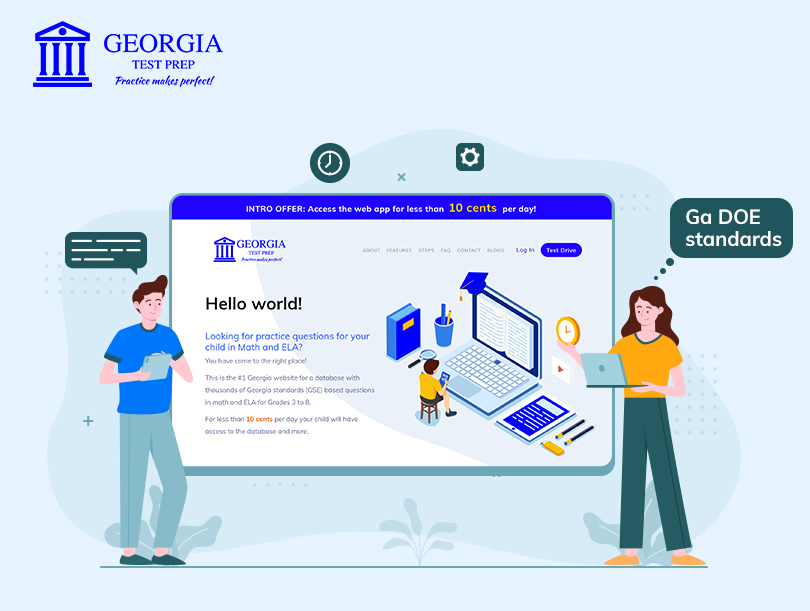Georgia Parents’ Ultimate Guide to Prepare your Child for Georgia Milestones Testing

As parents, we all want our children to succeed in life. In their early years, a large part of that involves doing well at school, and for Georgia state students a major landmark in their school years are the Georgia Milestones Tests.
The question on all of our minds is, “What can I do to help my child ace the Georgia Milestones Tests?”
The most important thing to understand is that preparation doesn’t happen overnight. It is an ongoing process that spans the entire school year. The good news is that Georgia state teachers are doing a great job in keeping students up to date with the curriculum, and there are things that you as a parent can do to motivate your children, help reinforce learning, and prepare them for Milestones Tests.
In broad strokes, parents can help their kids with Georgia Milestones preparation in the following ways:
- Help with subjects/school work
- Help with mental preparation
- Taking enough practice tests
Now, we parents are not trained educators, and we don’t have unlimited time to devote to our kids’ schooling. Although there are things that you can do to inculcate learning at home, you will need to entrust the majority of the load of curriculum teaching to the teachers. But mental preparation and practice testing are things that we can do that are high-impact and not high-load.
To that end, based on our research and experiences as parents who want their kids to thrive in their studies, we at Georgia Test Prep have put together this Georgia Parents’ Ultimate Guide to prepare your child for Georgia Milestones Testing.
Let’s get into it!
Treat your kids as stakeholders in their own studies
Your kids shouldn’t see going to school, learning, and taking tests as something that is forced upon them. Of course, it’s natural for kids to feel like this, and we’ve gone through it ourselves. But it’s our job to continuously create a positive mindset around their “learning career,” because learning doesn’t stop when school ends. Since assessments are an important part of school life, children must see them as a valuable part of their own growth journey. Building such an attitude starts with the way you talk about it with your children.
Encourage your kids to set goals
Setting a goal and writing it down is widely known as one of the best ways to motivate ourselves to do something. The same applies to our kids. Ask them to set a goal that is relevant to them. Perhaps they want to focus on being able to complete the test in time or to aim for getting a certain percentage of questions correct. Setting a goal encourages them to compare their actual results with intended results, and to assess what is working or not working in their own efforts. Children who set study goals progress more reliably than those who do not.
Encourage self-reflection
School moves a fast pace, and there’s a lot on a child’s mind other than their studies (let’s be frank). Recognize this, encourage your kids to recognize this, and adapt. One of the most effective things they can do is take some time for quiet self-reflection to contemplate and internalize what they know and what they still need to work on. This is why setting goals is very important rather than having a vague objective of “getting good marks”.
Build test-taking stamina
Studying for tests and the actual act of taking tests requires stamina, a fact that many of us ignore. Stamina is something we associate more readily with gym class. But when testing season comes around, reading, thinking, rereading, and answering questions for several hours, several days in a row is very taxing and requires a great deal of mental stamina to maintain focus.
One of the best test-prep tips you will hear is: Help your kids build their test-taking stamina, so they will be better prepared to answer GSA exams when the time comes. You can start small if need be, with 10-15 minute bursts of reading time or test-taking, and work up from there. Create a regimen along with your child that suits them best. This is gym class for the mind.
Read a little every night
Encourage your child to sit for 20 minutes reading silently to him or herself to build stamina. This shouldn’t be a problem if your child already has a reading habit, but if not, it’s a good opportunity to give them a bit of that. If they have focus issues, you can mix up the way reading is done by asking them to read to you, or listen while you read to them, or read together.
Praise the process
Praise is very important as a positive reinforcement, but praise wisely! In another article we covered in-depth the importance of creating a growth mindset in your kids. To summarize here, praise the process they took to solving problems and completing tests. This puts focus on the approach rather than sheer efforts or results, and instills in them a habit of refining their process to get better and better which will ultimately improve results.
Create a quiet study area
Designate one area as their test-focus zone. Free it of distractions (as far as possible) during their practice test time. You can keep a chart to track their total study time or testing progress, anything that will help motivate them and keep their eye on the prize.
Review grades/speak with teacher
Parents no doubt keep a track of their kids’ grades with progress reports and report cards. If you notice any anomalies in their grades, arrange to meet with your child’s teacher. See how you can work together to set up a plan to make sure your child is successful during the school year. You can ask them for Georgia Milestones resources or if they have any test-taking tips that have worked with students.
Plenty of rest and a nutritious, hot breakfast
Maintain a routine bed-time. Kids need to get a solid 8-9 hours of sleep. Routines are especially important during testing time, as there will be a lot of testing for several days back to back. If your child isn’t already in routine, it becomes difficult to adjust at short notice. Your child will benefit on test day with plenty of rest, so make it a habit.
Let’s not forget, a good, healthy breakfast (low in sugar) in the morning is very important! And while there’s nothing wrong with a bowl of cereal and cold milk, try and make something hot for them to warm up the stomach and the mind.
Practice typing on the computer
With testing moving towards being online-based, it’s a good idea to make sure your child is familiar with typing. In all likelihood, today’s kids are more computer-friendly than we are, but if they need help then there are online resources to help them get better such as typingclub.com and typehop.com.
Practice testing
This is one of the most important things you can implement at home. And Georgia Test Prep has a comprehensive bank of GSA questions designed by Georgia parents and teachers to help you do this.
Practice testing has been proven to be one of the most effective learning techniques. It has been found that taking practice tests on studied material promotes greater subsequent learning and retention on a final test as compared to relying on more common study strategies. This is called the "testing effect".
In other words, science supports what we know intuitively: in order for kids to retain what they’ve learned, they need to practice, practice, practice!
For maximum effect, do online practice for at least 30 minutes every week, and practice in short bursts over several sessions rather than long sessions. Read more about the benefits and science of practice testing in our other post.
The right online tools can be a big help in designing a rigorous and effective test preparation program for your child without taking up all of your time. Georgia Test Prep has your back with a tool that is created especially for Georgia state students. Check out our tool for online math practice and ELA questions.
Final thoughts
Preparing your child for the Georgia Milestones Tests is a multifaceted effort that takes time. Essentially, to prepare for any test requires two parallel efforts:
- Preparing for the subject of a test, that is, getting strong with the curriculum taught in school.
- Preparing for taking the actual test, that is, familiarizing your child with the test format, the different kinds of questions, and what the test actually feels like.
It sounds like a lot of work, but now that you know all the bases you won’t have to spread yourself thin. Concentrate your activities where your child needs the most help, keep an eye on their progress, and intervene with their teacher as and when necessary.
The most important thing to remember, before all else, is to make learning a positive experience. If kids are constantly living in fear of tests then it will hinder their learning process and knowledge absorption ability.
Check out the other articles on our blog for Georgia State Assessment preparation tips, tricks, and best practices.
Share This Post
Tags
Follow Us
Subscribe to our blogs.
Don't miss any updates!
Related Blogs
Everything You Need To Know About the Georgia Milestones Assessment System
If you’ve got a child in the Georgia state school system, then you’ve probably heard of the Geor... read more
Most Viewed Blogs
The Issues Parents Have Been Facing With Virtual Learning
School districts have done their best to plan learning contingencies due to the COVID situation. Som... read more
Everything You Need To Know About the Georgia Milestones Assessment System
If you’ve got a child in the Georgia state school system, then you’ve probably heard of the Geor... read more
5 Ways To Help Students Struggling With Reading Comprehension
Reading comprehension isn’t about being able to string words together, it’s about deriving meani... read more
Announcing the Launch of Georgia Test Prep
It is with great pleasure we announce that today we have launched Georgia Test Prep, an online solut... read more
7 Tips to Help Your Children Develop a Positive Attitude
In this Infographic, we have illustrated 7 tips to help your children develop a positive attitude. ... read more








